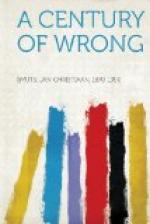Few, if any, Uitlanders avail themselves of this offer; the few who have done so are now satisfied with it, and continue to enjoy the privileges of the resolution, although it was only renewed in 1898 for those schools which made a bona fide use of it. Law No. 15, 1896, made provision for the children of poor parents and strangers on the proclaimed gold fields entirely at State expense, and 13 schools have been established by this law—with 51 teachers and about 1,500 scholars—at Barberton, Pilgrims’ Rest, Kaapsche Hoop, Johannesburg (5, viz., 1 in von Brandis Street, 1 at Braamfontein, 1 at Union Ground, 1 at Vredesdorp, and 1 in Market Street), Maraisburg, Krugersdorp, Randfontein, Klerksdorp, and Nigel. In addition to these, preparations are being made for State schools at the City and Suburban, Bertramstownship, Johannesburg, and at Roodepoort (Krugersdorp).
Out of the above-named 13 schools, English is the medium of instruction in four, and of the remaining nine English is the medium for the children of English-speaking parents, and Dutch for those of Dutch-speaking parents. In these nine schools a little more time is devoted to learning Dutch in each standard than was the case in the former standard, so that equality in both languages is reached at the 5th standard.
Altogether there are 27 Dutch Africander or Hollander teachers, and 24 teachers of English origin in these 13 schools. The Dutch Africander or Hollander teachers are obliged to possess a thorough knowledge of English, and have either to pass an examination or produce a certificate to that effect.
The object of the system of education in this Republic is to ensure in the first place the foundation of general knowledge. Law No. 8, 1892, provides this for the children of the original Boer population in their mother tongue, in which the necessary schoolbooks must be written, with this understanding, however, that in the 3rd standard three hours, and in the higher ones four hours, per week out of the 25 must be devoted to education in a foreign language.
With regard to the schools formed under the above-mentioned Resolution, teaching is carried on through the medium of a foreign language, but at least 5 hours per week must be devoted to the study of the official language of the country.
Of the 13 schools formed under Law 15 of 1896, the children of strangers are instructed in their own language, while the number of hours for instruction in and by means of Dutch is increased in each standard.
According to a Resolution of the First Volksraad, dated the 8th August, 1898, Article 731, a certain number of the School Board members required by Article I of Law 15 of 1896 have to be nominated and chosen by the Executive Council out of enfranchised persons (Article 2, Law 8, 1893) proposed by the fathers of the school children, on the understanding that the persons so chosen shall constitute less than half of




